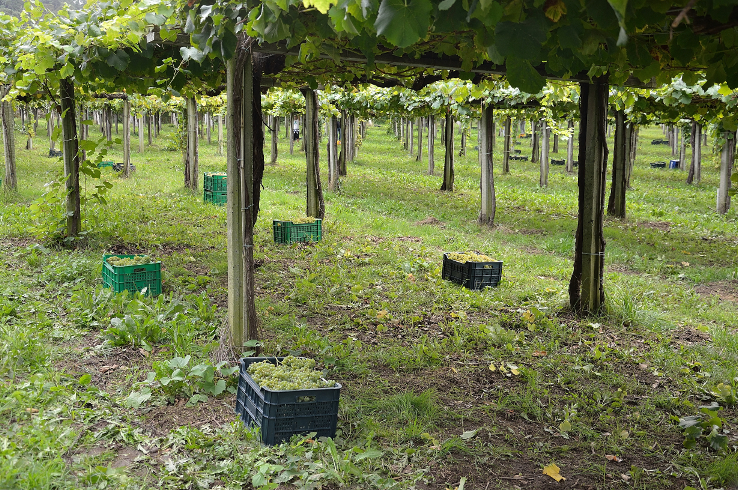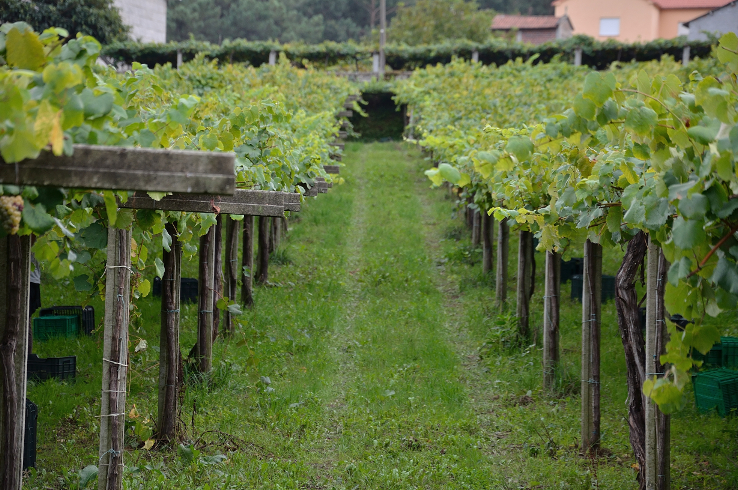2020 Viña Cartin Rías Baixas Albariño
Quintessential is the only word I can use to describe this wine. It comes from the ancestral home of Albariño, located directly on Spain’s Atlantic coast. It’s bright and refreshing… a solid weeknight staple.
Sustainable farming practices and hand-harvested.
- Tasting Notes Meyer lemon, clementine, citrus pith, honeydew, white grapefruit, marcona almond, sea salt
- Variety Albariño
- Region Spain, Rias Baixas
- Volume 750ml
- Alcohol Volume 13%
- Table Talk This wine comes from Val do Salnés, which many call the birthplace of Albariño.
Viña Cartín was founded in 1977 in Spain’s Salnés Valley, the oldest of Rias Baixas’ five subregions. In 2003, Viña Cartín moved their operations to a new location—an old winery in the heart of the area—and refurbished its interior with modern technology, yet maintained the estate’s artisanal character.
Contrary to the many regional wineries who purchase fruit, Viña Cartin proudly owns and sustainably farms 50 acres of their own vines. This direct access to the source allows them to control the raw material from start to finish. The estate’s vines average 30 years in age and benefit from the influence of the nearby Atlantic ocean. The resulting wines are bright, balanced, and laden with natural acidity.
ALBARINO
A pleasantly refreshing light white wine. Most known from Rias Baixas in Spain, but additionally as Vinho Verde in Portugal. Albariño’s are generally high in acid with refreshing citrus fruit flavors and a notably saline mineral character due to the regions’ proximity to the ocean. Serve these wines well-chilled while eating fish tacos on a hot summer day, you won’t be disappointed.
GALICIA, SPAIN
Part of what can be referred to as “Green” Spain, Galicia is located in the upper north west corner of the country. Wine production here dates back to the time of the Romans. It is one of the coolest areas producing refreshingly crisp Albariño with strong mineral characteristics as well as elegant red wine from the Mencía grape. Galicia boasts five denominated wine regions (DOs) including the infamous Rías Baixas, the closest DO to the Atlantic ocean.
Related Items
-
2023 Evening Land Salem Wine Co. Chardonnay
$30.00Evening Land Vineyards is the Oregon-based brainchild of Sashi Moorman and Raj Parr, two of California’s most revered winemakers and sommeliers.
Biodynamic farming practices, LIVE certified, hand-harvested, native yeast fermentation and only 695 cases produced.
This wine was voted Best of Club Argaux by members. Want a taste? SIGN UP and unlock special member pricing, free shipping and access to special allocations.
-
2023 Scribe Carneros Pinot Noir
$55.00Scribe, a pioneer of terroir-driven winemaking in Sonoma, makes one of our all-time favorite Pinots. Invite a few close friends over for an intimate dinner, light some candles, play some jazz and serve wild mushroom risotto topped with fish, chicken or as is! This Pinot will go with it all.
Organic farming practices, hand-harvested, native yeast fermentation (30% whole cluster), and aged 7 months in neutral oak with minimal intervention.
-
2024 Château Ducasse Graves Blanc (half-bottle)
$17.00This classic Graves Blanc blend enchants with an aromatic tapestry of citrus, peach, melon woven through with honeysuckle and fresh herbs. The Sémillon lends a rich, waxy texture to the palate, while the Sauvignon Blanc provides a fantastic zippy acidity for a clean, refreshing finish. There is a vivid saline energy that meets a flinty minerality reminiscent of this historical area.
45+ year old vines, Haute Valeur Environnementale Certified, vinification and aging in stainless steel, less than 9,000 cases produced.
-
NV Conquilla Cava Brut (half-bottle)
$12.00*These half-bottles make the cutest place cards for a Paella party!
This vibrant and refreshing sparkling born along the sun-drenched Spanish coast is one of our “party picks.” It’s made like Champagne, more interesting than Prosecco and it’s affordable! Crisp and dry, enjoy this with oysters, grilled fish, tapas or bruschetta.
Sustainable farming practices, estate-grown fruit, and aged for 12 months on the lees.










